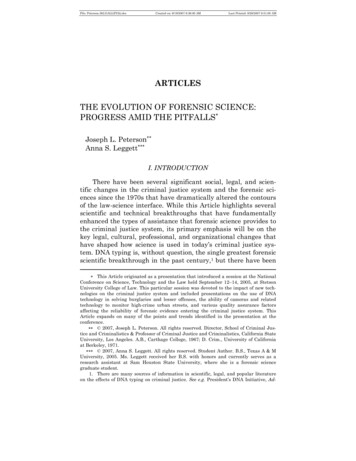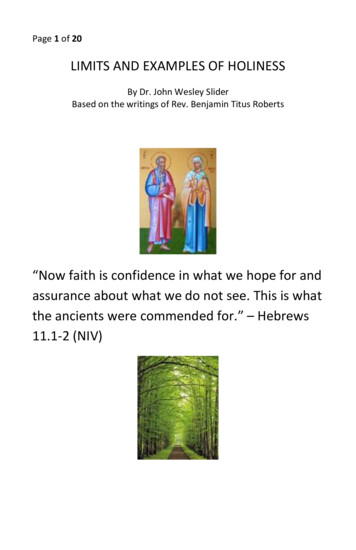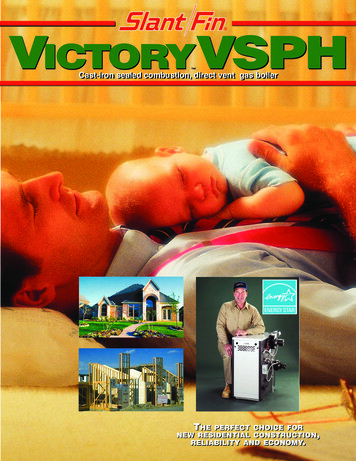
Transcription
MSAPLE
Holiness: Pitfalls, Struggles, and VictoryMPLECopyright 2016 by David CloudISBN 978-1-58318-215-4SAPublished by Way of Life LiteratureP.O. Box 610368, Port Huron, MI 48061866-295-4143 (toll free) fbns@wayoflife.orghttp://www.wayoflife.orgCanada: Bethel Baptist Church,4212 Campbell St. N., London, Ont. N6P 1A6519-652-2619Printed in Canada byBethel Baptist Print Ministry2
CONTENTSSAMPLEWalking or Flying.5Introduction .19Revival Is Near .21Principles of Holiness .29The Path of Holiness .61On Doubting Salvation.138Eternal Security .1513
PLESAMHoliness:Pitfalls, Struggles, and Victory4
Walking or FlyingSAMPLEBy the time I came to Christ at age 23, I was a messbecause of sin. I started drinking in high school and usingdrugs during a tour in Vietnam. After I returned to the Statesand was discharged from the Army, I sold drugs for a livingfor a short while, then I traveled across America from Floridato California and back twice, hitchhiking much of the way. Iwas living the foolish rock & roll lifestyle to the hilt. I joined aHindu meditation society and dabbled in other philosophies.Filthy habits, immorality, drugs, liquor, cursing andblasphemy, these things wound the spirit deeply, and theyleave moral and emotional scars. You can’t play with firewithout getting burned, and burns, even when healed, leavescars.I have struggled with depression throughout my Christianlife, and I am convinced that it stems from my formerlifestyle, particularly the heavy drug usage and even moreparticularly the hallucinogenic drugs such as LSD andpsilocybin. I believe I was harmed psychically andemotionally by marijuana, too, which was my first drug otherthan liquor and proved to be the door to other drugs.By the time I came to Christ, I was deeply depressed. Inever had a happy thought. I didn’t look forward to anything.My emotions were dead. My feelings were dark and anxious.I came to Christ in a motel room in Daytona Beach,Florida, in the summer of 1973. I had spent a few daystraveling with a Christian brother who patiently taught methe Bible, and the final night together the Lord answered theprayers of my mother and father and godly maternalgrandmother and others, and I was peacefully butdramatically converted. One hour I was antagonistic towardChrist and the Bible, believing there are many paths to Godand that I needed to follow my own heart, and the next hour5
SAMPLEI was a Bible believer who was 100% convinced that Christ isthe only Lord and Saviour.I began to grow and I was greatly changed in many ways,but I was still depressed a lot. It wasn’t as deep and relentlessas before, and now I looked forward to many things and wasexcited about life and could laugh again; but the depressionwas still real, and the devil used that. He would whisper tome that God hadn’t accepted me, that I was a hypocrite, thatI was unloveable and unloved, that there was no hope that Icould be changed. Some nights, especially, the battle wasterrible. Many times I again called out to the Lord to save me!The problem wasn’t limited to depression. The problemwas sin. I still got angry a lot. My thoughts weren’t alwayspure. I still doubted and feared. I still loved rock & roll. I wasstill greatly tempted by the lust of the flesh, the lust of theeyes, and the pride of life. I had renounced the world forChrist; I understand the world’s emptiness and unholiness,and on one hand I didn’t want anything more to do with it,but the world still had a hold on me in some ways.I wanted complete, abiding, unchanging victory, but Icouldn’t find it.I am reminded of Harry Ironside’s description of his earlyChristian life.“As nearly as I can now recollect, I was in theenjoyment of the knowledge of God’s salvation about amonth when, in some dispute with my brother, whowas younger than I, my temper suddenly escapedcontrol, and in an angry passion I struck and felled himto the ground. Horror immediately filled my soul. Ineeded not his sarcastic taunt, ‘Well, you are a niceChristian!’ . From this time on mine was an ‘up-anddown experience,’ to use a term often heard in‘testimony meetings.’ I longed for perfect victory overthe lusts and desires of the flesh. Yet I seemed to havemore trouble with evil thoughts and unholypropensities than I had ever known before. For a long6
time I kept these conflicts hidden, and known only toGod and to myself” (Ironside, Holiness the False and theTrue).SAMPLEFor the first several weeks after I came to Christ, I didn’thave a good church or Christian friends to help me. I waslooking for a church, but I hadn’t yet found a scriptural one.It was a difficult time, but the Lord used even thoseexperiences to teach me things I probably could not havelearned otherwise (Romans 8:28).Forty-three years later, I don’t have deep and dark andrelentless depression. That’s long gone, but at times I amplagued with mild depression, sometimes worse than othertimes. Many mornings I wake up depressed, and there aredays when it doesn’t entirely leave. Then I have very gooddays with no depression at all and I experience a lot of joy.I am saying that sin leaves scars and deep sin leaves deepscars, and you will live with those scars the rest of this life,and they will affect the depth and height of your holiness.(I am not writing a treatise on depression here. There arecauses for it other than the scars of sin, and these includephysical ailments and the sovereignty of God, Romans 8:28.The famous preacher Charles Spurgeon had a lot ofdepression, and he didn’t sow any “wild oats,” to speak of.)This must not be an excuse for sin, but it is a reality,nonetheless.It is a reminder of the importance of getting saved youngand living for Christ so that one’s life is not scarred bywallowing in sin. The popular idea that it is alright, perhapseven good, for young people in Christian homes andchurches to “sow some wild oats” is foolish and devilish.I began devouring Scripture from the first day I was saved.The man who led me to Christ bought me a large print KingJames Bible and a Strong’s Concordance, and I literally worethem out the first year.I wanted to “prove all things” by God’s Word so that Iwould not go astray or be deceived, and I understood that I7
SAMPLEcould not do this unless I knew God’s Word. I held fast totwo promises from Scripture. One was John 8:31-32, which isa promise that those who continue in God’s Word will knowthe truth and be set free. The other was John 7:17, which saysthat those who do God’s will shall know true doctrine. Iunderstood these to be conditional promises. If I continue inGod’s Word--reading, studying, memorizing, meditating,and obeying--I will know the truth and understand sounddoctrine.As a young Christian, I also I began studying aboutholiness and spiritual victory in resources outside of theBible.Since I was led to Christ by an old-line Pentecostal, I firststudied this from a Pentecostal perspective. I read books andattended some Pentecostal services and a Nicky CruzCrusade. I wanted everything the Lord had for me, andlonged for spiritual victory and growth. I wanted to getbeyond the struggle that I was experiencing as a youngChristian.Pentecostalism emphasizes a perfectionist holinessexperience that centers on a “baptism of the Spirit.” InPentecostal meetings, there is pressure to seek this experienceand to display an exuberance. I was supposed to be andexpected to be “be happy in the Lord,” but I wasn’t so veryhappy! It all felt very artificial and forced.I was encouraged by James 5:13. The afflicted isn’t told tobe merry; he is told to pray.I prayed about whether I should seek the baptism of theHoly Spirit, and I have no doubt that I would have sought itwith all my heart had I found justification in Scripture to doso. But I was studying Scripture earnestly and trying to testeverything by it, and I couldn’t find justification to seek thebaptism of the Spirit. There is no Scriptural command to seekit; the only mention of it in the Epistles is in the past tense (1Cor. 12:13); so I did not pursue that. The more I studied theScripture and the more I examined Pentecostalism, the more8
SAMPLEI saw that the “baptisms” and “tongues” and “prophesyings”practiced today are not what we find in Scripture. I graduallycame to a secessionist position on the apostolic gifts, beingconvinced that the sign gifts were apostolic and pertained tothe laying of the church’s foundation (2 Cor. 12:12; Eph.2:20). I don’t believe that miracles ceased, but I believe thatsign miracles ceased. I was further confirmed in this by thestudy of history, as I cannot see the apostolic sign giftsoperating scripturally anywhere in history since the apostles.Fairly early in my Christian life I talked with a Pentecostalpreacher from England who claimed to be a prophet. He waspreaching second Spirit baptisms and holy perfectionism.When I inquired about his walk with Christ, he admitted thathe had not achieved perfection. He said, “I do get frustratedand angry at times when I travel.” I thought, “Welcome tothe real world! You don’t have anything that I don’t have.”That was one of the many occasions when I realized thatthose who preach perfectionism or “always overflowing cup”experiences are theoreticians who don’t actually live it.At the first independent Baptist church I joined, I wasintroduced to “deeper life” or “higher life” teachings. The firstbook I read on that was Calvary Road by Roy and RevelHession. A godly Christian woman recommended it. She toldme that she read Calvary Road every year. Published in 1950,Calvary Road contains messages that first appeared in arevival paper titled Challenge published by the Hessionsbeginning in the 1940s. It describes an experience called“walking in revival” and “walking in the way of the cross”and “the highway life” that is achieved by focusing one’sattention on Calvary. It contains many excellent teachings ondying to self, humility, and sensitivity to sin. But there is anoverriding emphasis that one can walk in a near perfectspiritual revival experience that is described as a “life that willfill us and overflow through us,” “constant peace,” “walkingalong the Highway, with hearts overflowing,” “cupsoverflowing,”9
Roy Hession said that when he first came to thisunderstanding and experience it “was like beginning myChristian life all over again.” Consider these excerpts fromhis autobiography My Calvary Road:“I recounted my struggles with self and acknowledgedthe new relationship with Jesus which I had entered byfaith. . In the light of our own recent experience ofChrist, we preached a two-fold message: full salvationfor the Christian quite as much as an initial salvationfor the non-Christian. . If consecration is thoroughand complete, it need not be repeated. ‘Reconsecration’is the language of piecemeal surrender to the Lord JesusChrist.”SAMPLEThus Hession taught that it is necessary for the believer toenter into a second experience of Christ, a “full salvation,”and that if one achieves this experience he will be completelyand permanently surrendered and have a daily “overflowingcup” Christian life.Calvary Road is presented as a fool-proof plan for constantspiritual revival, but there is no such thing. While CalvaryRoad does not consist of one “key,” it does consist of severalthings that are presented together as the “key.”Let me hasten to say that if it weren’t for the emphasis onentering into an abiding overflowing cup experience that onecan allegedly achieve and maintain, I would recommendCalvary Road, because it does contain many good truths. Butthe overriding emphasis on a constant overflowing cupexperience and the teaching that one can get beyond thenecessity of “reconsecration” is a serious error, in myestimation.Calvary Road didn’t encourage me; it discouraged metremendously. I tried everything taught in Calvary Road asbest as I could with what I believe was complete dependencein Christ and dying to self, but instead of an always“overflowing cup,” my cup was often half empty. In fact,sometimes it seemed that there were only a couple ounces of10
SAMPLEholiness slopping around at the bottom! Forty plus yearslater, I still have days like that.I also read Miles Stanford’s Green Letters and others alongthat line, but I found the same emphasis, which, to me, wasthe little fox that spoiled the vine.I also read a booklet by John R. Rice about experiences ofvarious “great” preachers that allegedly placed them on ahigher plane of spiritual life and power. It was titled HowGreat Soul Sinners Were Filled with the Holy Spirit. It wasbasically a Pentecostal baptism of the Holy Spirit experience,but it was taught by a fundamental Baptist.I tried to do everything I learned. I desperately wantedmore spiritual victory. I was as earnest as I knew how to be,and I still am. I tried resting. I tried abiding. I tried doingnothing so that Christ would be all in all. I tried doingeverything. I tried walking in continual identification. I triedreckoning. I prayed. I wept. I asked the Lord to show meeverything that displeased Him. I confessed and repented. Ibegged the Lord to put me on that “higher plane” and plungeme into that “deeper life,” and I begged again and again.Through it all, I was growing. But it was a walkingexperience, not a flying one. Many of the steps were babysteps, and often the “walk” was more like slogging throughdeep mud. But through it all, I was growing.I would read 1 Corinthians 13 and Galatians 5:22-23 and 1Peter 1:15-16 and other passages about Christlikeness, holy
Principles of Holiness .29 #e Path of Holiness .61 On Doubting Salvation .138 Eternal Security .151 3 SAMPLE . life, and I am convinced that it stems from my former lifestyle, particularly the heavy drug usage and even more particularly the hallucinogenic drugs such as LSD and psilocybin. I believe I was harmed psychically and emotionally by marijuana, too, which was my %rst .











